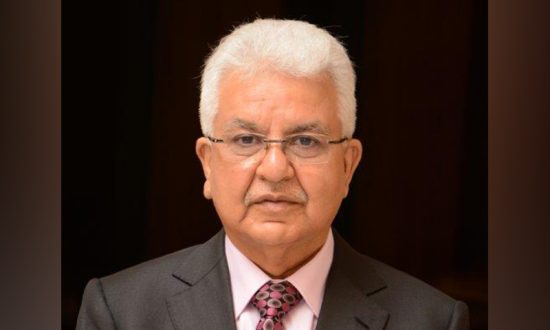The President PHD Chamber of Commerce & Industry (PHDCCI), Mr. Pradeep Multani is an eminent industrialist and a renowned name in the field of traditional medicine. For the last 32 years, he is the Chairman of Multani Pharmaceuticals Limited, an 83-year-old prestigious multi-crore limited company. He has an enriched experience of more than 40 years in the manufacturing of Ayurvedic and Unani medicine and products. He is currently serving as a President of PHDCCI, Co-Chairman, FICCI AYUSH Committee, and President of Association of Manufacturers of Ayurvedic Medicines (AMAM); moreover, Mr. Multani has been conferred with ‘Distinguished Entrepreneurship award for MSME 2019’ by PHDCCI. He holds a Bachelor’s Degree in Economics (Hons.) and Diploma in Labour Law from Delhi University.
Post COVID-19, when the world economic system has been undergoing a recovery phase and massive transformation, the Russia-Ukraine crises has casted a shadow on the global growth prospects. The geo-political developments have created a volatile and ambiguous economic and business environment, globally. Economies worldwide are facing headwinds because of increasing cost of living and downgraded outlook of economic growth.
The current geopolitical situation is having significant ramifications into oil and gas prices spiking, i.e. higher inflation, weaker consumer demand, tighter financial conditions, adverse impact on business sentiments and a delay in capex recovery. Since, India meets most of its oil needs through imports, the rising crude prices push up the country’s trade and current account deficit while also hurting the rupee and fuelling imported inflation.
May 2022 has been the fifth straight month in which the retail inflation has breached RBI’s comfort zone of 2-6% and has spurred rate hike decision for the RBI, while WPI Inflation remains in the double-digit range since the last 14 months.
The overall WPI inflation showed an upward trend during the last 12 months. The WPI inflation stood at 15.9% in May 2022 as compared to 13.1% in May 2021. The annual CPI inflation rate in India stood at 7.04% in May 2022 as compared to 6.3% in May 2021. Other upward pressure is mainly coming from prices of fuel and food & beverages. The recent upward pressure in both the segments, i.e. WPI and CPI inflation is majorly because of the rise in oil and other essential commodity prices on the back of geopolitical distress.
Businesses, especially MSMEs are facing the issues of declining production possibilities, reduction in anticipated sales volume, heightened operations & logistics costs, while individuals are being impacted by rise in the retail price of petrol and diesel and costlier food and other utility staples.
In its response, the Reserve Bank of India (RBI) has hiked the repo rate 2 times over the period of 2 months. After increasing the repo rate by 40 bps to 4.40% in May 2022, RBI on 8th June 2022 announced another increase in the policy repo rate by 50 bps to 4.90%. Also, the RBI has decided to remain focused on withdrawal of accommodation so that inflation is maintained within the target while supporting growth.
Though RBI’s decision to raise the repo rate is in synchrony with its efforts to tackle persistently heightened inflation, however monetary tightening will have an impact on consumption demand and resultant price corrections in the various goods and services in both consumption and whole sale segments. Also, the consequent increase in loan EMIs would impact the consumption sentiments and reduce demand in the economy which would lead to corrections in whole sale prices.
The ongoing depreciation in Rupee is another major worry as it would make India’s energy imports expensive and lead to further fuel inflation. The risk of imported inflation has only gone up with rupee plunging to record levels.
At this juncture, it is highly appreciable that the Central Government has recently taken the decision to reduce the excise duties on petroleum products to curb inflation. Few States have also followed the central government’s step and reduced taxes. At this juncture, more States should come forward to reduce the excise duties where there is price escalation.
Going ahead, inflation is expected to start softening by 2nd quarter of FY2023 on the back of diminishing unfavourable base effect particularly in food articles and liquidity drain as RBI has increased the repo rate by a significant 90bps recently. In case of CPI, the statistical effect will also start diminishing from the month of October-November 2022 and inflation will continuously soften towards the normal range of RBI upper band.
As the MSMEs are still recovering from the daunting impact of coronavirus, the combined efforts of the Central Government and the State Governments would better address the challenges posed by high inflation.
PHD Chamber suggests a 5 prong strategy to soften the inflation, including possible cut in the state excise duties especially on the petroleum products and bringing petroleum products under the ambit of GST; strengthening of the global value chains and shifting of the sources of the imports from higher price to low price countries; import substitution for the technology intensive and labour-intensive products where India has a high imports category and comprises higher import shares; enhancing indigenous production possibilities where there is high demand for the commodities; and measures for preventing hoarding of the essential commodities to stop price accelerations.
Though, India’s economic fundamentals are strong enough to cross these multiple headwinds, our approach need to be calibrated and proactive in mitigating the adverse impact on country’s economic growth, inflation and financial conditions. At this juncture, a continued handholding by the Government is required to mitigate the impact of recent geo-political developments while maintaining a balance between inflation and economic growth.


